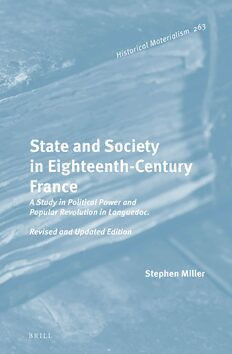
State and Society in Eighteenth-century France: A Study in Political Power and Popular Revolution in Languedoc PDF
Preview State and Society in Eighteenth-century France: A Study in Political Power and Popular Revolution in Languedoc
StateandSocietyinEighteenth-CenturyFrance Historical Materialism Book Series EditorialBoard LorenBalhorn(Berlin) DavidBroder(Rome) SebastianBudgen(Paris) SteveEdwards(London) JuanGrigera(London) MarcelvanderLinden(Amsterdam) PeterThomas(London) volume 263 Thetitlespublishedinthisseriesarelistedatbrill.com/hm TheLibraryofCongressCataloging-in-PublicationDataisavailableonlineathttps://catalog.loc.gov lcrecordavailableathttps://lccn.loc.gov/2022042176 TypefacefortheLatin,Greek,andCyrillicscripts:“Brill”.Seeanddownload:brill.com/brill‑typeface. issn1570-1522 isbn978-90-04-52610-5(hardback) isbn97-89-00-452611-2(e-book) Copyright2023byKoninklijkeBrillnv,Leiden,TheNetherlands. KoninklijkeBrillnvincorporatestheimprintsBrill,BrillNijhoff,BrillHotei,BrillSchöningh,BrillFink, Brillmentis,Vandenhoeck&Ruprecht,Böhlau,V&RunipressandWageningenAcademic. Allrightsreserved.Nopartofthispublicationmaybereproduced,translated,storedinaretrievalsystem, ortransmittedinanyformorbyanymeans,electronic,mechanical,photocopying,recordingorotherwise, withoutpriorwrittenpermissionfromthepublisher.Requestsforre-useand/ortranslationsmustbe addressedtoKoninklijkeBrillnvviabrill.comorcopyright.com. Thisbookisprintedonacid-freepaperandproducedinasustainablemanner. Contents ListofFiguresandTables vii Introduction 1 1 ThePeasantEconomy,SeigneurialRegime,andState 18 2 TheRewardsofRoyalService 44 3 CrownandNobilityinaTimeofFinancialDifficulties:RoyalPolicy 1758–89 76 4 RevolutionaryPolitics1788–91:DespotismandEquality 105 5 PopularRevolts,PoliticalAuthorityandtheRevolutionaryDynamic, 1789–93 130 6 PoliticsandClass,1792–99:Radicalism,Terror,andRepression 161 Conclusion 188 Appendix 203 Bibliography 214 Index 242 Figures andTables Figures 1.1 MapofthejurisdictionoftheParlementofToulouse 22 1.2 MapofthecivildiocesesofLanguedocbefore1789 23 2.1 Laurent-NicolasdeJoubert,sonofPhilippe-LaurentdeJoubert.Artist: François-XavierFabre,apainterofmonarchistsympathies,whosestudieswere fundedbyPhilippedeJoubert.FabrefledtheRevolutiontoItalyin1793.Getty Museum 61 2.2 LaPromenadedePeyrou,Montpellier.LibraryofCongress 65 2.3 Thearena,Nîmes,France.LibraryofCongress 66 4.1 MapofthedepartmentsoftheformerprovinceofLanguedoc 114 5.1 DowriesoftheinhabitantsoftheNarbonnaisandCorbièresintheeighteenth century 135 5.2 AssertionsofseigneurialrightsbydepartmentinoldregimeLanguedoc 155 Tables 1.1 SeigneurialleviesinLanguedoc 32 1.2 Judicialrulingsfavourabletoseigneurs1750–89 35 1.3 RulingsoftheParlementofToulouseenforcingseigneurialrights 40 2.1 Gagesofassociationsofofficeholders 45 2.2 Feescollectedbyassociationsofofficeholders 46 2.3 AveragedirecttaxpaidbyinhabitantsindiversepartsofLanguedoc 54 2.4 RevenuedistributedinconjunctionwiththeannualmeetingoftheEstatesof Languedoc 71 4.1 MunicipalcouncilofToulouse,February1790 118 4.2 CapitationofAlbi,1787 119 4.3 CapitationofMontpellier,1789 125 6.1 PercentageofthosearrestedintheGardin1793andtheyeariiclassifiedby socialandprofessionalgroup 179 6.2 PercentageofthoseexecutedintheGardduringtheTerrorclassifiedby profession 180 6.3 PercentageofmembersofthemunicipalcouncilofMontpellierclassifiedby socialandprofessionalgroup 182 6.4 PercentageofmembersofthemunicipalcouncilofToulouseclassifiedby socialandprofessionalgroup 183 viii figures and tables A.1 Recipientsof5,347,859LivresreimbursedbytheEstatesofLanguedocin1786 forloanstakenoutforthekingeveryyearsince1775 204 A.2 CreditorsofthedioceseofMontpellier 206 A.3 CreditorsofthedioceseofToulouse,1787and1788 207 A.4 ClassificationofprofessionsforfiveLanguedocianvillages 208 A.5 PeasantrevoltsinthedepartmentsofoldregimeLanguedoc 210 Introduction The intermediate, subordinate and dependent powers constitute thenatureof monarchicalgovernment;Imeanof thatinwhicha singlepersongovernsbyfundamentallaws.Isaidintermediate,sub- ordinate and dependent powers. And, indeed, in monarchies the prince is the source of all power, political and civil. These funda- mentallawsnecessarilysupposetheintermediatechannelsthrough whichthepowerflows:foriftherebeonlythemomentaryandcapri- ciouswillofasinglepersontogovernthestate,nothingcanbefixed, and,ofcourse,thereisnofundamentallaw. Themostnatural,intermediateandsubordinatepoweristhatofthe nobility.Thisinsomemeasureseemstobeessentialtoamonarchy, whosefundamentalmaximis,nomonarch,nonobility;nonobility, nomonarch. montesquieu,TheSpiritoftheLaws1 ∵ Instatingthatkingsruledthroughthenobility,Montesquieuidentifiedthedis- tinctiveattributeofEuropeanmonarchies.Hereditarynobilitysetthemapart fromtherepublicsofantiquityanddespotismsoftheEast.Thenoblesheldpos- itionsinthe‘intermediate,subordinateanddependentpowers’andinthisway ‘constitute[d]thenatureofmonarchicalgovernment’.Theyheldlordshipsover peasantvillages,beneficesintheupperechelonsof theChurch,venaloffices inthehightribunals,andclaimsonrevenuefromthetaxfarms. Theseintermediatepowerspermittedthenobilitytotakewealthfromcom- monsubjects.Theyacquiredfortunes‘bytakingawayapartof thecitizenry’s physicalnecessities’.Thegreatertheirwealth–‘from…thewholesalemerchant (négociant),tothenobles,magistrates,greatseigneurs,principalfinanciers,to theprinces’–themoretheyhadtospendonluxurysoastorestoretoproducers themeanstosurvive.2 ‘honour,thatis,theprejudiceofeachpersonandeachcondition’iswhat prompted luxury spending. It was a certain grandeur or dignity of the soul, 1 Montesquieu1949,vol.1,pp.15–16. 2 Montesquieu1949,vol.1,pp.15–18,53–4,67–70,163.Quotationvol.1,p.98. © 2 introduction whichsetthesocialandpoliticalforcesofmonarchicalgovernmentinmotion. Royal subjects were consumed by the ambition to distinguish themselves. Montesquieu argued that public honours increased in proximity to the king and all the riches of his court, and shone downward from this zenith of the state through the nobles to the people. The most honourable pursuit of the realmwastoservetheking,particularlyinwar.3 Monarchical government required stable laws and written customs. An arbitraryandcapriciousrulercouldpubliclyhumiliatehissubjectsandcom- promise their honour. Accordingly, Montesquieu held that venality of office wasagoodpracticein monarchies,becauseitmade theordersandranksof thestatemorepermanent.Hereditaryownersofofficescouldnotbedismissed for refusing to comply with orders.They thus militated against ill-conceived policiesemanatingfromtheroyalcouncil.Venality,Montesquieuargued,made governmentaltasksafamilyprofessionandbuiltupasenseofcommitmentto officialduties.Officesinthesovereigntribunals(therobenobilityofthejudi- ciary)formedkeypartsof theintermediatepowers,recordingtheproperties, honours, ranks, origins, rules, and restrictions applying to each subject. The judgesearnedtheadmirationoftheircountrymenbylookingaftereveryone’s rights.4 Thenoblesnotonlyusedtheirpositionsinthemonarchytoupholdtheir rightstoeconomicresources,publichonoursandpoliticalcareers.Theyalso usedthesepositionstoupholdroyalsovereignty.Kingswereundoubtedly‘the sourceof allpower’.Yettheydidnotexercisepowerallbythemselves.Mon- archical government required intermediate powers or ‘chiefs’, Montesquieu argued, to keep the people from taking things to extremes and to prevent the emergence of seditious elements, which might overthrow the king and instigaterevolution.Thesovereigntribunalshadtheconfidenceofthepeople, andindifficulttimes,couldsetthemright,orreducethemtoproperobedi- ence.5 Thisbookexaminestheforegoing‘fundamentalmaxim…nomonarch,no nobility;nonobility,nomonarch’.Itprobestherelationshipbetweentheking at the apex of the state and ‘the intermediate, subordinate and dependent powers’,whichimposedhispoliciesononeoftheprincipalprovinces,Langue- doc.Theargumentisthatscholarsmustfocusonthissocialconfigurationto understandtheoriginandunfoldingoftheFrenchRevolution. 3 Montesquieu1949,vol.1,pp.24–5,29–32,57,115.Quotationvol.1,p.24. 4 Montesquieu1949,vol.1,pp.15–18,23–4,25–6,53–4,55–7,67–73. 5 Montesquieu1949,vol.1,pp.15–18,55–6.LouisAlthussercalledattentiontothesepassages 1972,pp.85–6.
